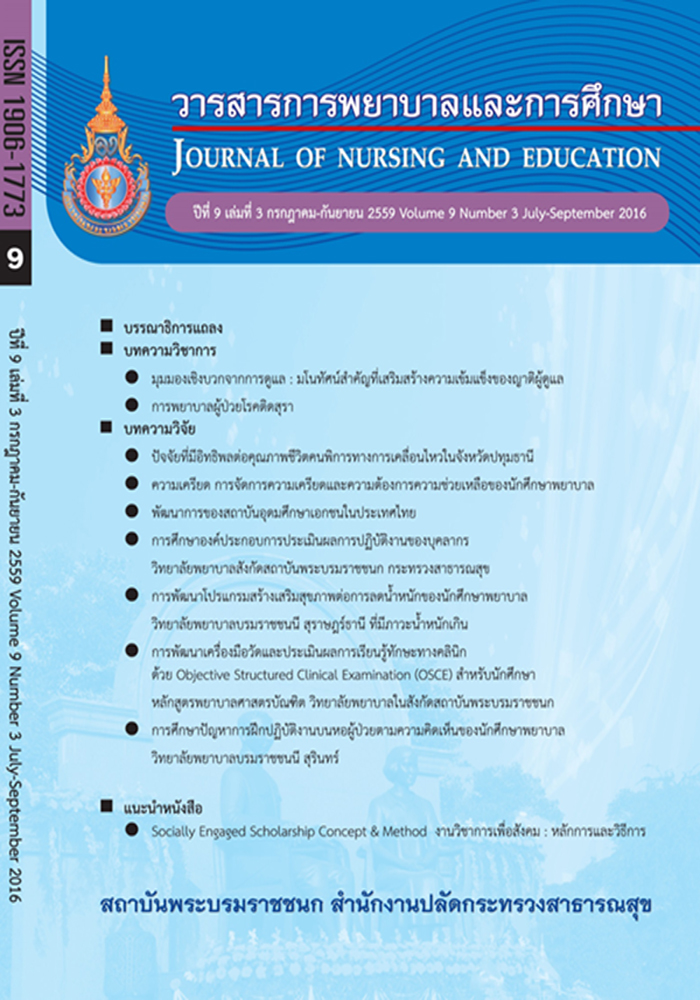มุมมองเชิงบวกจากการดูแล: มโนทัศน์สำคัญที่เสริมสร้างความเข้มแข็งของญาติผู้ดูแล
คำสำคัญ:
Family caregiver, Positive aspect of caregiving, PAC, Person with chronic conditionบทคัดย่อ
บทคัดย่อญาติผู้ดูแลมีบทบาทสำคัญยิ่งต่อการดูแลบุคคลผู้มีภาวะเรื้อรังในระบบการดูแลระยะยาวในบริบทสัมคมไทย มุมมองเชิงบวกเป็นมโนทัศน์ที่สำคัญในการเสริมสร้างความสุขจากการทำบทบาทของญาติผู้ดูแล แต่ที่ผ่านมุมมองดังกล่าวกลับถูกมองข้ามจากพยาบาลและบุคลากรสาธารณสุข บทความนี้มีวัตถุประสงค์เพื่อนำเสนอมุมมองเชิงบวกเพื่อให้เกิดความเข้าใจที่ชัดเจนมากขึ้น
มุมมองเชิงบวกจากการดูแล หมายถึง ความรู้สึกนึกคิดของผู้ดูแลที่รับรู้ถึงประโยชน์ หรือประสบการณ์ที่ดีที่เกิดขึ้นจากการทำบทบาทการดูแล มี 3 องค์ประกอบคือ 1) การรับรู้ความสำเร็จที่เกิดจากการดูแล 2) การรับรู้ความรู้สึกในแง่ดีที่เกิดจากการดูแล และ 3) การรับรู้สัมพันธภาพที่ดีระหว่างบุคคลที่เกิดจากการดูแล ซึ่งนักวิชาการได้พัฒนาเครื่องมือใช้ในการประเมินที่หลากหลาย เช่น Positive Aspects of Caregiving (PAC) Reward of Caregiving Scale (RCS) Scale for Positive Aspects of Caregiving Experience (SPACE) Finding meaning through caregiving scale (FMTCS) เป็นต้น ทั้งนี้ มุมมองเชิงบวกเปรียบเสมือน “ตัวคั่นกลาง” ที่เพิ่มผลลัพธ์ด้านบวก และยังเป็น “เกราะป้องกัน” การเกิดผลลัพธ์ด้านลบจากการดูแล ดังนั้น พยาบาล และบุคลากรด้านสุขภาพควรให้ความสำคัญ ไม่มองข้าม และร่วมกันเติมเต็ม/ต่อยอดองค์ความรู้ เพื่อเสริมสร้างความเข้มแข็งของญาติผู้ดูแล นำไปสู่ผลลัพธ์ที่ดี เพื่อเพิ่มคุณภาพของผู้ดูแลและผู้มีภาวะเจ็บป่วยเรื้อรังในระยะยาวต่อไป
Positive aspect of caregiving: Crucial concepts enhancing family caregivers’ strength
AbstractFamily caregiver plays a crucial role in long-term care system for persons with chronic conditions in Thailand’s context. A positive aspect is a significant concept to enhance happiness of family caregiver’s role. However, this concept was overlooked by nurses and healthcare professionals. The aim of this article is to propose the Positive Aspect of Caregiving (PAC).
PAC means cognitions and emotions of caregivers to percept the benefits or optimistic experiences that occur from caregiving roles. It consists of three components: 1) the perception of accomplishment from caregiving, 2) the perception of optimistic feeling of caregiving, and 3) the perception of companionship from caregiving. Experts have developed a variety of instruments to assess positive aspect, for example the Positive Aspects of Caregiving (PAC), the Reward of Caregiving Scale (RCS), the Scale for Positive Aspects of Caregiving Experience (SPACE), and the Finding meaning through caregiving scale (FMTCS). This aspect implies a "mediator" to improve the positive consequences and also a "buffer" of the negative consequences from caregiving context. Nurses and health care personnel should emphasize, not overlook, and participate in fulfillment the gap and develop knowledge of PAC for enhancing family caregivers’ strength, in order to increase the quality of life among caregiver themselves and persons with chronic condition who they care in the long-term care.






